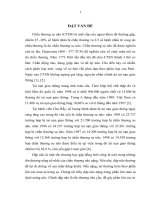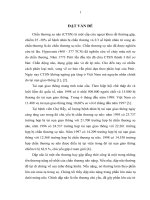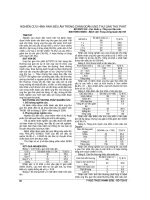Nghiên cứu giá trị của GP73 trong chẩn đoán ung thư gan trên bệnh nhân nhiễm virus viêm gan B
Bạn đang xem bản rút gọn của tài liệu. Xem và tải ngay bản đầy đủ của tài liệu tại đây (444.19 KB, 17 trang )
ĐẠI HỌC QUỐC GIA HÀ NỘI
TRƢỜNG ĐẠI HỌC KHOA HỌC TỰ NHIÊN
Trần Thị Thanh Huyền
NGHIÊN CỨU GIÁ TRỊ CỦA GP73 TRONG
CHẨN ĐOÁN UNG THƢ GAN TRÊN BỆNH NHÂN
NHIỄM VIRUS VIÊM GAN B
LUẬN VĂN THẠC SĨ KHOA HỌC
Hà Nội - 2015
ĐẠI HỌC QUỐC GIA HÀ NỘI
TRƢỜNG ĐẠI HỌC KHOA HỌC TỰ NHIÊN
Trần Thị Thanh Huyền
NGHIÊN CỨU GIÁ TRỊ CỦA GP73 TRONG
CHẨN ĐOÁN UNG THƢ GAN TRÊN BỆNH NHÂN
NHIỄM VIRUS VIÊM GAN B
Chuyên ngành
: Sinh học thực nghiệm
Mã số
: 60420114
LUẬN VĂN THẠC SĨ KHOA HỌC
NGƢỜI HƢỚNG DẪN KHOA HỌC:
PGS. TS. Lê Hữu Song
PGS. TS. Hoàng Thị Mỹ Nhung
Hà Nội - 2015
LỜI CAM ĐOAN
Tôi xin cam đoan:
Luận văn này là công trình nghiên cứu thực sự được thực hiện dưới sự hướng
dẫn khoa học của PGS.TS Lê Hữu Song – Bệnh viện TƯQĐ 108, PGS.TS Hoàng
Thị Mỹ Nhung – Trường Đại học Khoa học Tự nhiên, Đại học Quốc Gia Hà Nội.
Các số liệu, những kết quả nghiên cứu được trình bày trong luận văn này trung
thực và chưa từng được công bố dưới bất cứ hình thức nào.
Tôi xin chịu trách nhiệm về các kết quả nghiên cứu của mình.
Học viên
Trần Thị Thanh Huyền
LỜI CẢM ƠN
Để có thể hoàn thành luận văn này, tôi xin bày tỏ lòng kính trọng, biết ơn
sâu sắc tới PGS.TS. Lê Hữu Song – Bệnh viện TƯQĐ 108; PGS.TS. Hoàng Thị
Mỹ Nhung – Bộ môn Sinh học tế bào, Khoa Sinh học, Trường Đại học Khoa học
Tự nhiên đã trực tiếp hướng dẫn, chỉ bảo tận tình trong suốt thời gian tôi thực hiện
đề tài.
Tôi xin trân trọng cảm ơn PGS. TS. BS. Phan Quốc Hoàn đã tạo điều kiện
để tôi thực hiện luận văn tại khoa Sinh học phân tử - Bệnh viện Trung ương quân
đội 108; tới các anh chị tại khoa Sinh học phân tử - Bệnh viện Trung ương quân đội
108 đã giúp đỡ và động viên tôi trong suốt thời gian qua.
Tôi xin trân trọng cảm ơn các thầy cô giáo Bộ môn Sinh học Tế bào và lãnh
đạo Khoa Sinh học đã giảng dạy và tạo điều kiện thuận lợi cho tôi học tập và
nghiên cứu.
Tôi cũng xin gửi lời cảm ơn tới gia đình, người thân và bạn bè đã ủng hộ,
giúp đỡ tạo điều kiện để tôi có thể hoàn thành được luận văn này.
Tôi xin chân thành cảm ơn!
Hà Nội, ngày
tháng
năm 2015
Học viên
Trần Thị Thanh Huyền
MỤC LỤC
ĐẶT VẤN ĐỀ .................................................... Error! Bookmark not defined.
CHƢƠNG 1. TỔNG QUAN ............................. Error! Bookmark not defined.
1.1. Tình hình dịch tễ học bệnh ung thƣ gan.Error! Bookmark not defined.
1.1.1. Dịch tễ học trên thế giới. .............. Error! Bookmark not defined.
1.1.2. Dịch tễ học tại Việt Nam. ............. Error! Bookmark not defined.
1.2. Nguyên nhân và các yếu tố nguy cơ gây ung thƣ gan.Error! Bookmark not def
1.3. Mối liên quan giữa nhiễm HBV với ung thƣ gan.Error! Bookmark not defined
1.4. Chẩn đoán ung thƣ biểu mô tế bào gan.Error! Bookmark not defined.
1.4.1. Khám lâm sàng. ............................ Error! Bookmark not defined.
1.4.2. Xét nghiệm cận lâm sàng. ............ Error! Bookmark not defined.
1.4.3. Các phương pháp chẩn đoán hình ảnh ........ Error! Bookmark not
defined.
1.4.4. Chọc hút tế bào và sinh thiết khối u ............ Error! Bookmark not
defined.
1.5. Tổng quan về GP73. ............................. Error! Bookmark not defined.
1.5.1. Đặc điểm sinh học của GP73. ...... Error! Bookmark not defined.
1.5.2. Mức độ biểu hiện protein GP73. .. Error! Bookmark not defined.
1.5.3. Điều hòa biểu hiện gen GP73....... Error! Bookmark not defined.
1.5.4. Ý nghĩa của GP73 trong chẩn đoán HCC. .. Error! Bookmark not
defined.
1.6. Tình hình nghiên cứu các dấu ấn phân tử về HCC.Error! Bookmark not defin
1.7. Các phƣơng pháp đánh giá mức độ biểu hiện gen hiện nay.Error! Bookmark
CHƢƠNG 2. VẬT LIỆU VÀ PHƢƠNG PHÁP NGHIÊN CỨUError! Bookmark not
2.1. Đối tƣợng nghiên cứu ........................... Error! Bookmark not defined.
2.1.1. Tiêu chuẩn lựa chọn bệnh nhân ... Error! Bookmark not defined.
2.1.2. Tiêu chuẩn loại trừ ....................... Error! Bookmark not defined.
2.2. Vật liệu và thiết bị nghiên cứu ............ Error! Bookmark not defined.
2.2.1. Các hoá chất, sinh phẩm. .............. Error! Bookmark not defined.
2.2.2. Các máy và thiết bị chính sử dụng trong nghiên cứu.Error! Bookmark not d
2.3. Phƣơng pháp nghiên cứu. .................... Error! Bookmark not defined.
2.3.1. Thu thập mẫu bệnh phẩm ............... Error! Bookmark not defined.
2.3.2. Sơ đồ nghiên cứu ............................ Error! Bookmark not defined.
2.3.3. Xác định mức độ biểu hiện gen mARN GP73.Error! Bookmark not defined.
2.3.4. Định lượng protein GP73 bằng kỹ thuật ELISA.Error! Bookmark not define
2.3.5. Các phương pháp định lượng AFP, sinh hoá, hoá nghiệmError! Bookmark n
2.3.6. Xét nghiệm định lượng HBV-ADN Error! Bookmark not defined.
2.3.7. Phân tích và xử lý số liệu. ............... Error! Bookmark not defined.
CHƢƠNG 3. KẾT QUẢ VÀ BÀN LUẬN ...... Error! Bookmark not defined.
3.1. Đặc điểm các nhóm nghiên cứu. ......... Error! Bookmark not defined.
3.1.1. Đặc điểm về tuổi và giới. ............ Error! Bookmark not defined.
3.1.2. Đặc điểm về một số chỉ số cận lâm sàng thông thường.Error! Bookmark n
3.2. So sánh nồng độ HBV–ADN giữa các nhóm nghiên cứu.Error! Bookmark not
3.3. Xác định mức độ biểu hiện GP73. ...... Error! Bookmark not defined.
3.3.1. Xác định mức độ biểu hiện gen mARN GP73.Error! Bookmark not define
3.3.2. Xác định mức độ biểu hiện gen protein GP73.Error! Bookmark not define
KẾT LUẬN VÀ KIẾN NGHỊ ...................................................................... 55
TÀI LIỆU THAM KHẢO ............................................................................ 56
DANH MỤC HÌNH
Hình 1.1: Biểu đồ phân bố tỷ lệ mắc mới và tần suất tử vong của một số bệnh ung
thư điển hình trên thế giới (Globocan – 2012). ......... Error! Bookmark not defined.
Hình 1.2: Biểu đồ phân bố tỷ lệ mắc mới và tần suất tử vong của một số bệnh ung
thư điển hình ở Việt Nam (Globocan – 2012). ......... Error! Bookmark not defined.
Hình 1.3: Các nguyên nhân gây ung thư .................. Error! Bookmark not defined.
Hình 1.4: Cấu trúc của GP73 và sGP73 ................... Error! Bookmark not defined.
Hình 2.1: Nguyên lí của phản ứng RealTime PCR sử dụng đầu dò Taqman .. Error!
Bookmark not defined.
Hình 3.1: So sánh nồng độ HBV-ADN giữa các nhóm bệnh gan. Error! Bookmark
not defined.
Hình 3.2: Kết quả giải trình tự gen GP73 ................................................................44
Hình 3.3: Hình ảnh tín hiệu huỳnh quang trong Realtime PCR của gen GP73 và gen
nội chuẩn ABL. ......................................................... Error! Bookmark not defined.
Hình 3.4: So sánh mức độ biểu hiện của mARN GP73 giữa các nhóm bệnh nhân và
nhóm người khỏe mạnh............................................. Error! Bookmark not defined.
Hình 3.5: So sánh mức độ biểu hiện của mARN GP73 giữa các nhóm nghiên cứu.
................................................................................... Error! Bookmark not defined.
Hình 3.6: Đường cong ROC của mARN GP73 và AFP ........ Error! Bookmark not
defined.
Hình 3.7: Nồng độ protein GP73. ............................ Error! Bookmark not defined.
Hình 3.8: So sánh mức độ biểu hiện của protein GP73 giữa các nhóm bệnh nhân và
nhóm người khỏe mạnh............................................. Error! Bookmark not defined.
Hình 3.9: So sánh mức độ biểu hiện của protein GP73 giữa các nhóm nghiên cứu.
................................................................................... Error! Bookmark not defined.
Hình 3.10: Đường cong ROC của protein GP73 và AFP ...... Error! Bookmark not
defined.
DANH MỤC BẢNG
Bảng 2.1: Danh mục các hóa chất sử dụng trong nghiên cứu Error! Bookmark not
defined.
Bảng 2.2: Danh mục các thiết bị .............................. Error! Bookmark not defined.
Bảng 3.1: Đặc điểm về tuổi và giới giữa các nhóm nghiên cứu. .. Error! Bookmark
not defined.
Bảng 3.2: Đặc điểm về các chỉ số cận lâm sàng giữa các nhóm nghiên cứu. ..........33
Bảng 3.3: So sánh nồng độ AFP giữa các nhóm nghiên cứu . Error! Bookmark not
defined.
Bảng 3.4: Tính chất khối U gan và phân loại mức độ bệnh theo Barcelona Clinic
Liver Cancer (BCLC) ................................................ Error! Bookmark not defined.
Bảng 3.5: So sánh nồng độ HBV–ADN giữa các nhóm nghiên cứu ............... Error!
Bookmark not defined.
Bảng 3. 6: Nồng độ đo OD và độ sạch của ARN ..... Error! Bookmark not defined.
Bảng 3.7: Kết quả định lượng tương đối mARN ..... Error! Bookmark not defined.
Bảng 3.8: So sánh mức độ biểu hiện mARN GP73 giữa nhóm bệnh gan và nhóm
người khỏe mạnh ....................................................... Error! Bookmark not defined.
Bảng 3.9: So sánh mức độ biểu hiện gen mARN GP73 giữa các nhóm nghiên cứu
................................................................................... Error! Bookmark not defined.
Bảng 3.10: Nồng độ đo OD của protein GP73 ......... Error! Bookmark not defined.
Bảng 3.11: So sánh mức độ biểu hiện protein GP73 giữa các nhóm bệnh gan và
nhóm người khỏe mạnh............................................. Error! Bookmark not defined.
Bảng 3.12: So sánh mức độ biểu hiện protein GP73 giữa các nhóm nghiên cứu
................................................................................... Error! Bookmark not defined.
DANH MỤC CÁC CHỮ VIẾT TẮT
AFP
: Alpha Feto Protein
bp
: base pair
cADN
: complementary ADN
dNTP
: deoxyribonucleotide triphosphate
ADN
: Acid deoxyribonucleic
ABL
: Abelson
ARN
: Acid ribonucleic
ELISA
: Enzyme Linked Immunosorbent Assay (Kỹ thuật miễn
dịch gắn men)
GOLM1
: Golgi Membrane Protein 1
GP73
: Golgi protein 73
HBsAg
: Hepatitis B surface Antigen (Kháng nguyên bề mặt
virus viêm gan B)
HBV
: Hepatitis B virus (Virus viêm gan B)
HCC
: Hepatocellular carcinoma (Ung thư tế bào gan nguyên
phát)
CHB
: Chronic hepatitis (Viêm gan B mạn tính)
CH
: Healthy control (Nhóm người khỏe mạnh)
LC
: Liver cirrhosis (Xơ gan)
M-MLV
: Moloney Murine Leukemia Virus
mARN
: Messenger ARN
PCR
: Polymerase Chain Reaction (Phản ứng chuỗi trùng hợp)
Real Time PCR
: Real Time Polymerase chain Reaction (Phản ứng chuỗi
trùng hợp tính theo thời gian thực)
RT- PCR
: Reverse transcriptase Polymerase chain Reaction (Phản
ứng chuỗi trùng hợp sử dụng enzyme phiên mã ngược)
RT
: Reverse transcription (Quá trình phiên mã ngược)
ROC curve
: Receiver operating characteristic curve – đường cong
ROC
VGM
: Viêm gan mạn
VRVGB
: Virus viêm gan B
TÀI LIỆU THAM KHẢO
1.
2.
3.
4.
5.
6.
7.
8.
9.
10.
11.
A H. S. R. a. A. L. (2000), "Tumours of the Liver and
Intrahepatic Bile Ducts", World Health Organization
Classfication of Tumors, IARC press, pp. 158-202.
al A. H. e. (2012), "Development of Hepatocellular
Carcinoma Associated with Anabolic Androgenic Steroid
Abuse in a Young Bodybuilder: A Case Report", Case
Reports in Pathology, 2012.
al E. M. e. (2003), "Cancer risk in patients with
hereditary hemochromatosis and in their first-degree
relatives", Gastroenterology, 125(6), pp. 1733-1741.
al F. T. e. (2014), "Alcohol and liver cancer: a
systematic review and meta-analysis of prospective
studies", Annals of Oncology, 25, pp. 1526-1535.
Bagnardi V B. M., La Vecchia C et al. (2001), "A metaanalysis of alcohol drinking and cancer risk", Br J
Cancer, 85, pp. 1700-1705.
Beillard E., Pallisgaard N., van der Velden V. H. et
al. (2003), "Evaluation of candidate control genes for
diagnosis and residual disease detection in leukemic
patients
using
'real-time'
quantitative
reversetranscriptase polymerase chain reaction (RQ-PCR) - a
Europe against cancer program", Leukemia, 17(12), pp.
2474-86.
Block TM C. M., Lowman M, Steel LF, Romano PR, Fimmel
C, et al (2005), "Use of targeted glycoproteomics to
identify serum glycoproteins that correlate with liver
cancer in woodchucks and humans", Proc Natl Acad Sci
USA, 102, pp. 779-784.
Bosch F. X., Ribes J., Diaz M. et al. (2004), "Primary
liver
cancer:
worldwide
incidence
and
trends",
Gastroenterology, 127(5 Suppl 1), pp. S5-S16.
Chen C. J., Yang H. I., Su J. et al. (2006), "Risk of
hepatocellular carcinoma across a biological gradient
of serum hepatitis B virus DNA level", JAMA, 295(1),
pp. 65-73.
Clark M. F., Adams A. N. (1977), "Characteristics of
the microplate method of enzyme-linked immunosorbent
assay for the detection of plant viruses", J Gen
Virol, 34(3), pp. 475-83.
Claudio Pelucchi S. D. S. G., Sc.D.;
Werner
Garavello, M.D.; Cristina Bosetti, Sc.D.;
and Carlo
La Vecchia, M.D. (2006), "Cancer risk associated with
alcohol and tobacco use: focus on upper aerdisgetive
tract and liver", Health risks, 29(3), pp. 193-198.
3
12.
13.
14.
15.
16.
17.
18.
19.
20.
21.
22.
23.
24.
Diseases A. A. f. t. S. o. L. (2010), "Management of
Hepatocellular Carcinoma: An Update", HEPATOLOGY, Vol.
000, No. 000, pp. 1-35.
Donati M., Brancato G., Donati A. (2010), "Clinical
biomarkers in hepatocellular carcinoma (HCC)", Front
Biosci (Schol Ed), 2, pp. 571-7.
Donato F T. A., Gelatti U, Parrinello G, Boffetta P,
Albertini A, Decarli A, Trevisi P, Ribero ML, Martelli
C,
Porru
S,
Nardi
G
(2002),
"Alcohol
and
hepatocellular carcinoma: the effect of lifetime
intake and hepatitis virus infections in men and
women.", Am J Epidemiol., 155(4), pp. 323-331.
Engvall
E.,
Perlmann
P.
(1971),
"Enzyme-linked
immunosorbent assay (ELISA). Quantitative assay of
immunoglobulin G", Immunochemistry, 8(9), pp. 871-4.
Fattovich G., Stroffolini T., Zagni I. et al. (2004),
"Hepatocellular carcinoma in cirrhosis: incidence and
risk factors", Gastroenterology, 127(5 Suppl 1), pp.
S35-50.
Fimmel C. J., Wright L. (2009), "Golgi protein 73 as a
biomarker of hepatocellular cancer: development of a
quantitative serum assay and expression studies in
hepatic and extrahepatic malignancies", Hepatology,
49(5), pp. 1421-3.
Forner A R. M., Bruix J (2009), "Alpha-fetoprotein for
hepatocellular carcinoma diagnosis: the desmise of
abrilliant star", Gastroenterology, 137.
Goh C. W. a. K. (2006), "Chronic hepatitis B infection
and liver cancer", Biomed Imaging Interv J, 2(3).
Gu Y., Chen W., Zhao Y. et al. (2009), "Quantitative
analysis of elevated serum Golgi protein-73 expression
in patients with liver diseases", Ann Clin Biochem,
46(Pt 1), pp. 38-43.
Hashem
B.
El-Serag
M.
D.,
M.P.H.
(2011),
"Hepatocellular Carcinoma", The New England journal
of medicine, 365, pp. 1118-1127.
Hayashi PH D. B. A. (2005), "The progression of
hepatitis B- and C-infections to chronic liver disease
and
hepatocellular
carcinoma:
epidemiology
and
pathogenesis.", Med Clin North Am., 89(2), pp. 371389.
HB. E.-S. (2001), "Epidemiology of hepatocellular
carcinoma", Clin Liver Dis, 5, pp. 87-107.
Hu J. S., Wu D. W., Liang S. et al. (2010), "GP73, a
resident Golgi glycoprotein, is sensibility and
specificity for hepatocellular carcinoma of diagnosis
in a hepatitis B-endemic Asian population", Med Oncol,
27(2), pp. 339-45.
4
25.
26.
27.
28.
29.
30.
31.
32.
33.
34.
35.
36.
37.
38.
Iain H. McKillop L. W. S. (2005), "Alcohol and liver
cancer", Alcohol, 35, pp. 195-203.
Iftikhar R., Kladney R. D., Havlioglu N. et al.
(2004), "Disease- and cell-specific expression of GP73
in human liver disease", Am J Gastroenterol, 99(6),
pp. 1087-95.
Iloeje U. H., Yang H. I., Su J. et al. (2006),
"Predicting cirrhosis risk based on the level of
circulating hepatitis B viral load", Gastroenterology,
130(3), pp. 678-86.
J F., I S., M E. et al. (2013), "GLOBOCAN 2012 cancer incidence
and mortality worldwide: IARC cancerbase", International Agency for
Research on Cancer, 11.
Jordi
Bruix
M.
S.
(2010),
"Management
of
Hepatocellular Carcinoma: An Update", AASLD PRACTICE
GUIDELINE, HEPATOLOGY, Vol. 000, No. 000, 2010.
Kang J. E., Hwang S. H., Lee J. H. et al. (2011),
"Effects of RBC removal and TRIzol of peripheral blood
samples on RNA stability", Clin Chim Acta, 412(19-20),
pp. 1883-5.
Kladney R. D., Bulla G. A., Guo L. et al. (2000),
"GP73, a novel Golgi-localized protein upregulated by
viral infection", Gene, 249(1-2), pp. 53-65.
Kladney R. D., Cui X., Bulla G. A. et al. (2002),
"Expression of GP73, a resident Golgi membrane
protein, in viral and nonviral liver disease",
Hepatology, 35(6), pp. 1431-40.
Kladney R. D., Tollefson A. E., Wold W. S. et al.
(2002), "Upregulation of the Golgi protein GP73 by
adenovirus infection requires the E1A CtBP interaction
domain", Virology, 301(2), pp. 236-46.
Ko SC F. L., Smith EA, Fenlon N, Koneru AK, Murphy TV
(2014), "Estimated Annual Perinatal Hepatitis B Virus
Infections in the United States, 2000-2009", J
Pediatric Infect Dis Soc.
Kumada T., Toyoda H., Kiriyama S. et al. (2010),
"Incidence of hepatocellular carcinoma in patients
with chronic hepatitis B virus infection who have
normal alanine aminotransferase values", J Med Virol,
82(4), pp. 539-45.
La Vecchia C N. E., Cavalieri d’Oro L et al. (1998),
"Liver cirrhosis and the risk of primary liver
cancer", Eur J Cancer Prev, 7, pp. 315-320.
Larsson SC W. A. (2007), "Overweight, obesity and risk
of liver cancer: a meta-analysis of cohort studies",
Br J Cancer, 97(1005-1008).
Liu Y C. C., Marsh GM, Wu F (2012), "Population
attributable risk of aflatoxin-related liver cancer:
5
39.
40.
41.
42.
43.
44.
45.
46.
47.
48.
49.
50.
systematic review and meta-analysis", Eur J Cancer
Prev, 48(14), pp. 2125-2136.
Livak K. J., Schmittgen T. D. (2001), "Analysis of
relative
gene
expression
data
using
real-time
quantitative PCR and the 2(-Delta Delta C(T)) Method",
Methods, 25(4), pp. 402-8.
LONDON W. T. A. M., K.A. (1996), "Liver cancer",
Cancer Epidemiology and Prevention, pp. 772-793.
Luis Jesuino de Oliveria Andrade A. D. O., Junior,
Rosangela Carvalho Melo,1 Emmanuel Conrado De Souza,1
Carolina Alves Costa Silva, and Raymundo Paraná
(2009),
"Association
Between
Hepatitis
C
and
Hepatocellular Carcinoma", J Glob Infect Dis., 1(1),
pp. 33-37.
Maitra A., Thuluvath P. J. (2004), "GP73 and liver
disease:
a
(Golgi)
complex
enigma",
Am
J
Gastroenterol, 99(6), pp. 1096-8.
Malaguarnera G., Giordano M., Paladina I. et al.
(2010), "Serum markers of hepatocellular carcinoma",
Dig Dis Sci, 55(10), pp. 2744-55.
Manno M., Camma C., Schepis F. et al. (2004), "Natural
history of chronic HBV carriers in northern Italy:
morbidity
and
mortality
after
30
years",
Gastroenterology, 127(3), pp. 756-63.
Mao Y., Yang H., Xu H. et al. (2010), "Golgi protein
73
(GOLPH2)
is
a
valuable
serum
marker
for
hepatocellular carcinoma", Gut, 59(12), pp. 1687-93.
Mao Y. L., Yang H. Y., Xu H. F. et al. (2008),
"[Significance of Golgi glycoprotein 73, a new tumor
marker in diagnosis of hepatocellular carcinoma: a
primary study]", Zhonghua Yi Xue Za Zhi, 88(14), pp.
948-51.
Marcello Donati G. B., Angelo Donati (2010), "Clinical
biomarkers in hepatocellular carcinoma", Frontiers in
Bioscience S2, pp. 571-577.
Marrero J. A., Romano P. R., Nikolaeva O. et al.
(2005), "GP73, a resident Golgi glycoprotein, is a
novel serum marker for hepatocellular carcinoma", J
Hepatol, 43(6), pp. 1007-12.
McMahon B. J., Alberts S. R., Wainwright R. B. et al.
(1990), "Hepatitis B-related sequelae. Prospective
study in 1400 hepatitis B surface antigen-positive
Alaska native carriers", Arch Intern Med, 150(5), pp.
1051-4.
Mizuguchi T., Katsuramaki T., Nobuoka T. et al.
(2004), "Serum hyaluronate level for predicting
subclinical liver dysfunction after hepatectomy",
World J Surg, 28(10), pp. 971-6.
6
51.
52.
53.
54.
55.
56.
57.
58.
59.
60.
61.
62.
63.
64.
65.
Nguyen V. T., Law M. G., Dore G. J. (2008), "An
enormous hepatitis B virus-related liver disease
burden projected in Vietnam by 2025", Liver Int,
28(4), pp. 525-31.
Ozkan H., Erdal H., Tutkak H. et al. (2011),
"Diagnostic and prognostic validity of Golgi protein
73 in hepatocellular carcinoma", Digestion, 83(1-2),
pp. 83-8.
Pilia G., Hughes-Benzie R. M., MacKenzie A. et al.
(1996), "Mutations in GPC3, a glypican gene, cause the
Simpson-Golabi-Behmel overgrowth syndrome", Nat Genet,
12(3), pp. 241-7.
Sangiovanni A D. N. E., Fasani P, De Fazio C, Ronchi
G, Romeo R, Morabito A, De Franchis R, Colombo M
(2004), "Increased survival of cirrhotic patients with
a
hepatocellular
carcinoma
detected
during
surveillance.", Gastroenterology, 126(4), pp. 10051014.
Sherlock S., Fox R. A., Niazi S. P. et al. (1970),
"Chronic liver disease and primary liver-cell cancer
with
hepatitis-associated
(Australia)
antigen
in
serum", Lancet, 1(7659), pp. 1243-7.
Shi Y., Chen J., Li L. et al. (2011), "A study of
diagnostic value of golgi protein GP73 and its genetic
assay in primary hepatic carcinoma", Technol Cancer
Res Treat, 10(3), pp. 287-94.
Van Weemen B. K., Schuurs A. H. (1971), "Immunoassay
using antigen-enzyme conjugates", FEBS Lett, 15(3),
pp. 232-236.
Wang Y W. B., Shen F et al. (2012), "Body mass index
and risk of primary liver cancer: a meta-analysis of
prospective studies", Oncologist, 17, pp. 1461-1468.
WHO (2015), "Hepatitis B".
WHO (2015), "Hepatitis C".
Willyard C. (2007), "Researchers look for 'sweet'
method to diagnose cancer", Nat Med, 13(11), pp. 1267.
Wright L. M., Huster D., Lutsenko S. et al. (2009),
"Hepatocyte GP73 expression in Wilson disease", J
Hepatol, 51(3), pp. 557-64.
Wright L. M., Yong S., Picken M. M. et al. (2009),
"Decreased survival and hepato-renal pathology in mice
with C-terminally truncated GP73 (GOLPH2)", Int J Clin
Exp Pathol, 2(1), pp. 34-47.
Wu F. S., Zheng S. S., Wu L. J. et al. (2006), "[Study
on the prognostic value of hepatocyte growth factor
and
c-met
for
patients
with
hepatocellular
carcinoma]", Zhonghua Wai Ke Za Zhi, 44(9), pp. 603-8.
Zhou Y., Yin X., Ying J. et al. (2012), "Golgi protein
73 versus alpha-fetoprotein as a biomarker for
7
66.
hepatocellular carcinoma: a diagnostic meta-analysis",
BMC Cancer, 12, pp. 17.
Zhu Z. W., Friess H., Wang L. et al. (2001), "Enhanced
glypican-3 expression differentiates the majority of
hepatocellular
carcinomas
from
benign
hepatic
disorders", Gut, 48(4), pp. 558-64.
8









